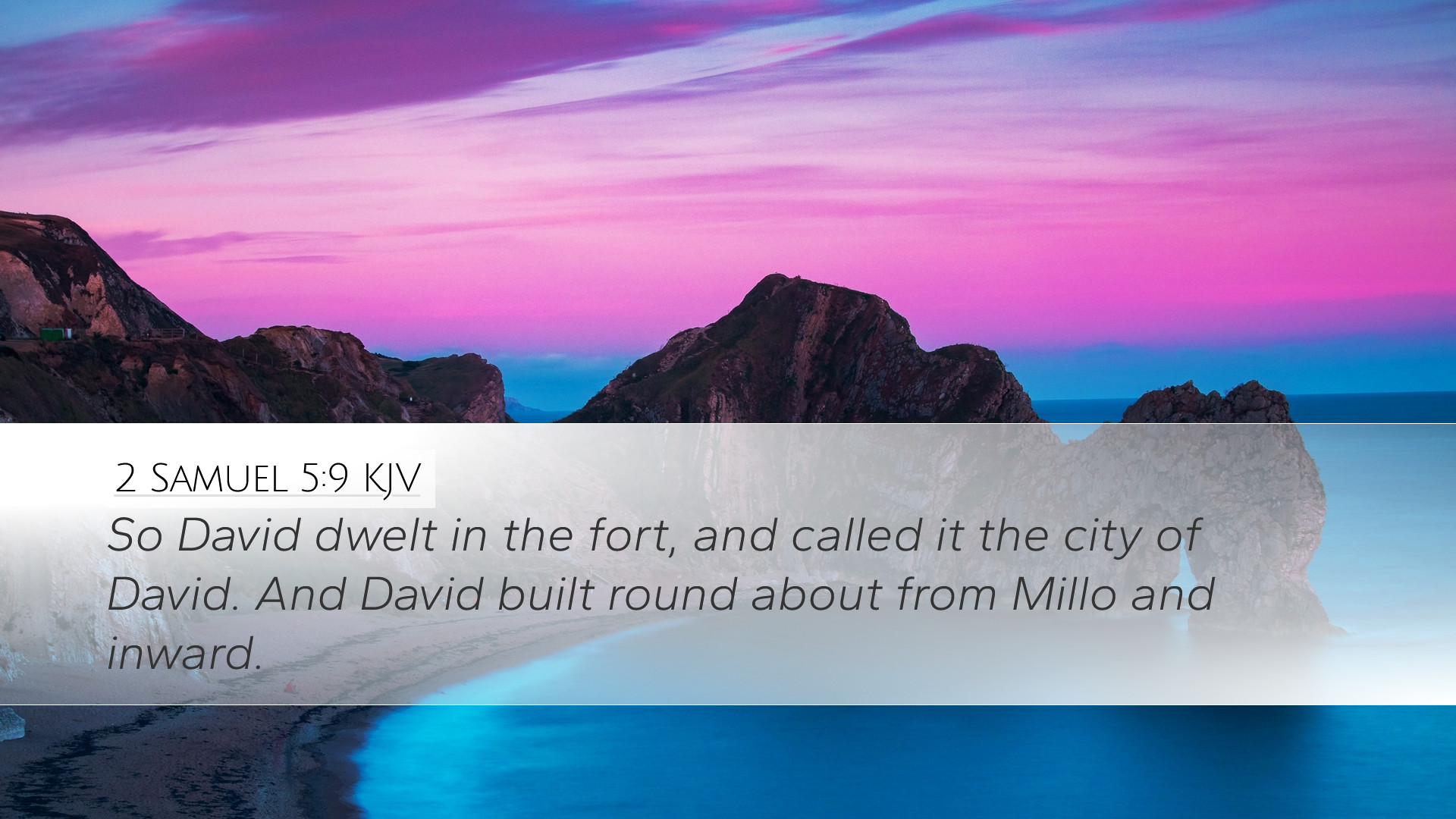Commentary on 2 Samuel 5:9
Verse: "And David dwelt in the fort, and called it the city of David. And David built round about from Millo and inward." (2 Samuel 5:9)
Introduction
This verse marks a significant transition in the history of Israel, highlighting David's establishment of Jerusalem as the political and spiritual capital of the nation. Public domain commentaries from Matthew Henry, Albert Barnes, and Adam Clarke provide an in-depth understanding of its implications for pastoral leaders, scholars, and students.
The Significance of David's Dwelling
David's choice to dwell in the fort symbolizes a fortified position both militarily and spiritually. Henry emphasizes the importance of security that the fortification represents, while also pointing out that David needed a stronghold during a time of transition and conflict.
Historical Context
During this time, Israel was undergoing significant upheaval. The united monarchy under Saul faced division, and David's rise represented hope for unity. Clarke notes that David’s fortifying actions were more than military; they were a deliberate establishment of his authority and a preparation for the coming challenges.
The City of David
Designating the stronghold as the "City of David" holds deep theological and historical importance. Barnes comments on the implications of this title, noting that it not only establishes David's rule but also foreshadows the future significance of Jerusalem in biblical prophecy.
Theological Implications
The naming of Jerusalem as the "City of David" implies that it is chosen by God as a central location for worship, leadership, and governance. This choice reflects God’s divine plan for His people and is critical for understanding the later significance of Jerusalem in the New Testament, particularly in relation to Jesus Christ.
The Construction of Millo
David's engagement in building "round about from Millo and inward" symbolizes not only physical construction but also the establishment of national identity. Millo itself is mentioned in various contexts throughout Scripture, representing a strengthening of the infrastructure of the city.
Interpretations of Millo
Henry describes Millo as an important engineering project that demonstrated David's leadership and vision. It suggests a cultural and structural integration, setting the stage for Jerusalem to be a place of worship and governance.
In contrast, Clarke offers insights into the possible confusion regarding Millo's exact location but reinforces its symbolic importance as part of the city’s fortifications.
Application for Pastors and Leaders
For modern pastoral leaders, this passage offers rich insights into the establishment of spiritual authority and community. David's actions emphasize the need for a secure spiritual foundation in ministry. The City of David becomes a metaphor for drawing believers into a relationship with Christ as our stronghold.
Leadership Lessons
- Establish Boundaries: Just as David fortified Jerusalem, leaders must establish spiritual and community boundaries.
- Unity of Purpose: David united the tribes of Israel, an allegory for today’s church to focus on unity in Christ.
- Strategic Planning: The construction of Millo highlights the importance of intentional planning in ministry endeavors.
Conclusion
2 Samuel 5:9 serves as a pivotal verse in understanding David’s significance in biblical history. The establishment of Jerusalem as the City of David not only reflects on David’s reign but also speaks volumes about God’s unfolding plan in the trajectory of Israel and, ultimately, the Church. As pastors, students, and scholars delve into this verse, they uncover foundational truths about leadership, community, and divine purpose.
Reflection Questions
- How can leaders today establish a "City of David" in their spheres of influence?
- In what ways does David's example inform our approach to community building and governance?
- What does it mean for Christ to be our stronghold in light of David's fortifications?


